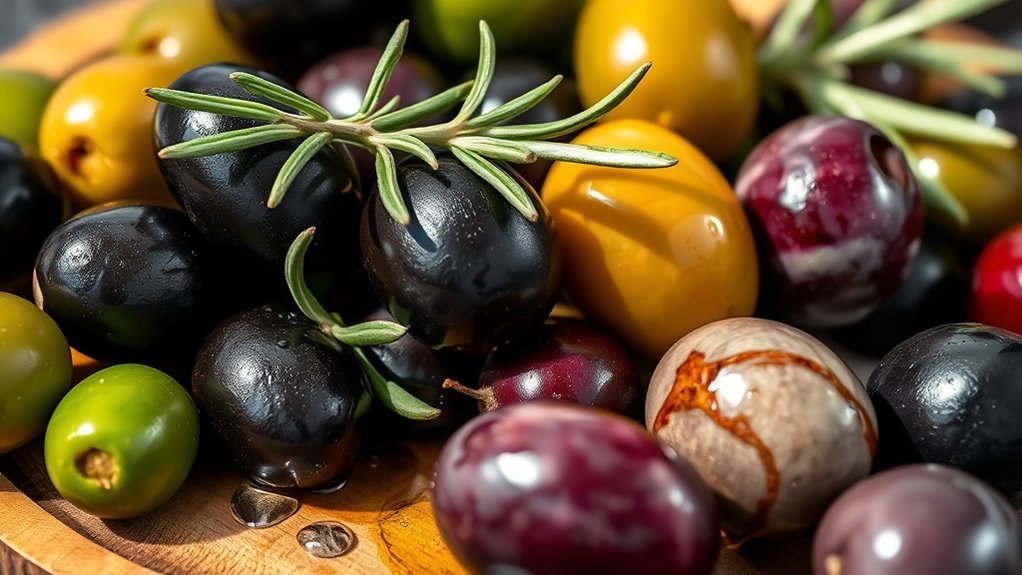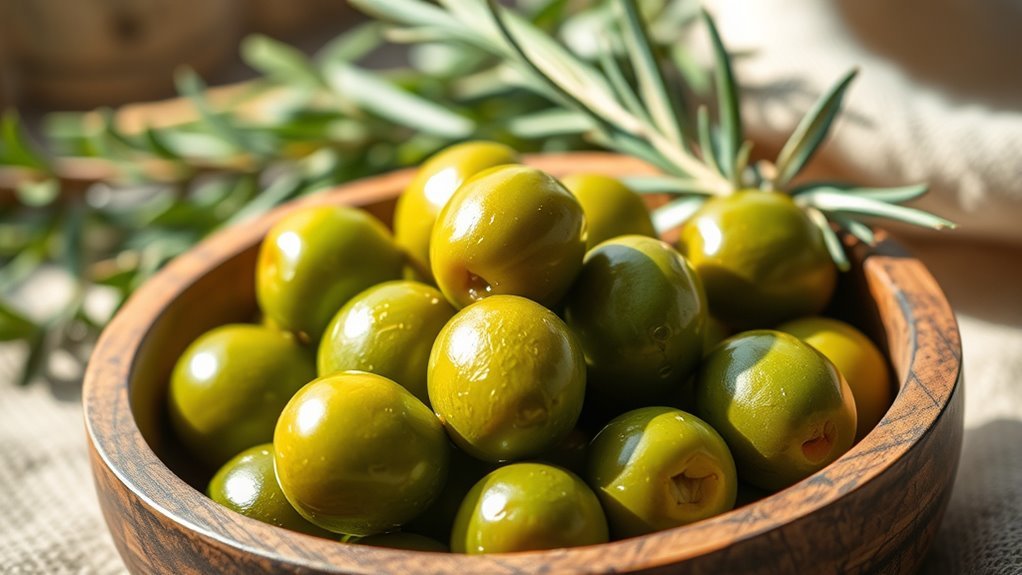Yes, olives are definitely keto-friendly! They’re low in carbohydrates, with green olives having about 1 gram and black olives around 3 grams per 100 grams. Rich in healthy fats and antioxidants, olives support heart health and are great for satiety, making them perfect for a ketogenic diet. Incorporate them into your meals or snacks easily. If you want to explore more ways to enjoy olives on your keto journey, just keep going!
Nutritional Profile of Olives

When you’re considering a keto diet, the nutritional profile of olives can be quite appealing. Different olive varieties, such as Kalamata and Castelvetrano, offer unique flavors and textures while providing essential health nutrients. Olives are rich in monounsaturated fats, which can support heart health and promote satiety. They’re also an excellent source of antioxidants, including vitamin E and polyphenols, which can help combat oxidative stress. Additionally, olives contain small amounts of fiber, iron, and calcium, contributing to overall wellness. Their low carbohydrate content makes them an ideal snack or addition to meals, fitting seamlessly into your keto lifestyle. By incorporating olives into your diet, you can enjoy a delicious, nutrient-dense food that aligns with your health goals. Furthermore, olives are generally low in carbs, making them a good choice for keto diets.
Carbohydrate Content in Olives

When considering olives for a keto diet, it’s important to look at their carbohydrate content. Generally, olives are low in carbs, making them a suitable choice for those maintaining a ketogenic lifestyle. Understanding their nutritional profile can help you incorporate them effectively into your meals. Additionally, olives are rich in healthy fats that support heart health and can enhance your overall nutrient intake.
Nutritional Profile of Olives
Olives are a flavorful addition to many dishes, but their nutritional profile is what truly sets them apart, especially for those following a keto diet. The carbohydrate content in various olive varieties is quite low, making them a fantastic choice. Here’s what you should know about their nutritional benefits:
- Low in Carbs: Most olives contain around 1-2 grams of carbs per serving.
- Healthy Fats: They’re rich in monounsaturated fats, promoting heart health.
- Antioxidants: Olives are loaded with antioxidants, which can combat inflammation.
- Vitamins and Minerals: They provide essential nutrients, including vitamin E and iron. Additionally, Kalamata olives are particularly beneficial due to their high antioxidant content.
Incorporating olives into your diet not only enhances flavor but also offers numerous health benefits, aligning perfectly with your keto lifestyle.
Keto-Friendly Carbohydrate Levels
If you’re following a keto diet, understanding the carbohydrate levels in olives can help you make informed choices. Olives are low in carbohydrates, making them an excellent option for keto snacks. Typically, a 100-gram serving of olives contains about 3-6 grams of net carbs, depending on the olive varieties. Green olives tend to have slightly fewer carbs than black ones. By incorporating olives into your meals, you can enjoy their healthy fats while staying within your carb limits. They’re versatile and can be added to salads, antipasto plates, or consumed as a snack. Just remember to watch out for added ingredients that might raise the carb count. Enjoy the freedom of choosing olives on your keto journey!
Health Benefits of Olives

While you might enjoy olives for their unique flavor, they also offer a range of health benefits that can enhance your diet. Here are four key advantages:
Olives not only delight your palate but also provide numerous health benefits to enrich your diet.
- Antioxidant Properties: Olives contain powerful antioxidants, which can help combat oxidative stress and reduce inflammation in your body.
- Heart Health: Rich in healthy fats, olives can support cardiovascular health by lowering bad cholesterol levels and promoting good cholesterol.
- Nutrient Density: They’re packed with essential vitamins and minerals, including vitamin E, iron, and copper.
- Weight Management: Including olives in your meals can promote satiety, helping you maintain a healthy weight while enjoying delicious flavors. Additionally, incorporating olives into a high-fat diet can align with the principles of the ketogenic diet, enhancing overall health benefits.
Incorporating olives into your diet not only satisfies your taste buds but also supports your overall well-being.
Types of Olives and Their Keto Compatibility
When exploring the world of olives, it is essential to know that not all varieties are created equal, especially regarding a keto diet. Green olives are typically lower in carbohydrates and higher in healthy fats, making them a great option for your keto lifestyle. They contain around 1 gram of net carbs per 100 grams, allowing you to enjoy them without worrying about exceeding your carb limit. On the other hand, black olives also offer keto compatibility, with about 3 grams of net carbs per 100 grams. While both types are nutritious, green olives might edge out slightly for those strictly monitoring carb intake. Ultimately, including either variety can enhance your meals while keeping you aligned with your keto goals. Additionally, leafy greens pair wonderfully with olives, providing a flavorful and nutritious base for salads.
Incorporating Olives Into a Keto Diet
Incorporating olives into your keto diet can be both simple and delicious. With a variety of olive types to choose from, you can easily add flavor and nutrition to your meals. Here are some ideas for keto snacks featuring olives:
- Stuffed Olives: Fill them with cream cheese or feta for a rich, satisfying treat.
- Olive Tapenade: Blend various olive varieties with garlic and herbs for a tasty spread on keto-friendly crackers.
- Salads: Toss olives into salads for added fat and flavor, enhancing your overall nutrient intake.
- Antipasto Platter: Create a platter with olives, meats, and cheeses for a fulfilling snack option that aligns with your keto goals.
Additionally, green olives are a low-carb snack option that can help you enjoy flavorful treats without exceeding your daily carb limits. Enjoy the freedom of experimenting with olives while staying true to your keto lifestyle!
Olive Oil: A Keto-Friendly Alternative
Olive oil is an excellent choice for those following a keto diet, as it’s rich in healthy fats and low in carbohydrates. One of the key olive oil benefits is its high content of monounsaturated fats, which can support heart health while providing the energy you need. Plus, it’s packed with antioxidants that can help fight inflammation. You can easily incorporate olive oil usage in your daily meals—drizzle it on salads, use it for sautéing vegetables, or as a base for low-carb dressings. This versatility makes it an essential staple in a keto-friendly kitchen. By choosing olive oil, you’re not just adding flavor; you’re also fueling your body with nutrients that align with your dietary goals. Additionally, olive oil, like coconut milk, contains healthy saturated fats that can enhance your overall nutritional intake.
Common Myths About Olives and Keto
Despite their popularity, several myths persist about olives and their compatibility with a keto diet. Let’s clear up some common olive misconceptions:
Myths about olives and keto diets abound; let’s debunk these misconceptions for a healthier, flavorful experience.
- High in Carbs: Many believe olives are carb-heavy, but they actually contain minimal carbohydrates, making them keto-friendly.
- Only Black Olives Are Keto: Both black and green olives are low in carbs and fit well into a keto lifestyle.
- Olives Are Fattening: While olives are high in healthy fats, they’re beneficial and support ketosis rather than hinder it.
- Olives Are Processed: Most olives are minimally processed, retaining their nutritional value, unlike some other snacks.
Additionally, olives are a great source of healthy fats that can enhance satiety and support your overall health while on a keto diet. Understanding these points can help you incorporate olives into your diet without worry, enhancing your keto compatibility and enjoying their rich flavors.
Recipes Featuring Olives for Keto Enthusiasts
Whether you’re looking to spice up your meals or add a nutritious snack, olives can be a versatile ingredient in your keto-friendly recipes. For a quick appetizer, whip up a zesty olive tapenade by blending olives, capers, garlic, and olive oil. Serve it with cucumber slices for a revitalizing crunch. If you crave something heartier, try stuffed olives. Fill pitted olives with cream cheese or feta, then sprinkle with herbs for an explosion of flavor. You can even toss olives into salads or roasted vegetables for added texture and taste. With their low carb content and rich healthy fats, olives are perfect for maintaining your keto lifestyle while enjoying delicious meals. Healthy fats are essential for achieving and maintaining ketosis, so incorporating olives into your diet is a smart choice. Get creative and enjoy!
Frequently Asked Questions
Can Olives Trigger Cravings for Non-Keto Foods?
When it comes to olive cravings, it’s a double-edged sword. While olives can be a satisfying keto snack, they might also spark cravings for non-keto foods if you’re not careful. The rich flavors and fats in olives can leave you wanting more, potentially leading to indulgence in higher-carb options. To keep those cravings at bay, balance your intake with other keto-friendly snacks and stay mindful of your overall diet.
Are Pickled Olives Still Keto-Friendly?
Yes, pickled olives can still be keto-friendly. They maintain low carbohydrate counts, making them a great snack for your low-carb lifestyle. Depending on the olive varieties, pickled nutrition may vary slightly, but most provide healthy fats and minimal carbs. Just be cautious of added sugars in some pickled products, as they can impact your carb intake. Enjoy them in moderation, and they can easily fit into your keto diet!
How Should Olives Be Stored for Freshness?
Imagine your olives as treasures, yearning to stay fresh. To safeguard their brilliance, store them in the fridge, submerged in their brine or olive oil. This refrigeration method can extend their shelf life considerably, allowing you to savor them longer. If you’re using dry olives, keep them in an airtight container at room temperature, but remember, they won’t last as long. Treat your olives well, and they’ll reward you with delightful flavor.
Do Olives Contain Any Allergens?
Olives generally don’t contain common allergens, making them a safe choice for most people. However, if you’re sensitive to certain foods, it’s always wise to check specific brands or varieties, especially those packed in brine or oil that might have added ingredients. Besides being low in calories, olives offer numerous health benefits, including healthy fats and antioxidants that support heart health and reduce inflammation. Enjoy them freely but stay informed!
Can Olives Be Consumed on a Fasting Day?
Yes, you can consume olives on a fasting day! In fact, olives are low in calories and packed with healthy fats, making them a great snack. Studies show that incorporating healthy fats can enhance fasting benefits, potentially improving metabolic health. With just around 5 calories per olive, their nutrient density supports your energy needs without breaking your fast. So, enjoy those olives and reap the nutritional rewards while staying focused on your fasting goals!
1. Are olives keto-friendly?
Yes, olives are considered keto-friendly. They are low in carbohydrates and high in healthy fats, making them an excellent choice for those following a ketogenic diet. A serving of olives typically contains about 1-2 grams of net carbs, which fits well within the daily carb limit of most keto plans.
2. How many net carbs are in olives?
The net carbs in olives can vary depending on the type and preparation. On average, a standard serving of about 10-15 olives contains approximately 1-2 grams of net carbs. This makes olives a suitable snack or addition to meals for those adhering to a ketogenic diet.
3. What health benefits do olives provide on a keto diet?
Olives offer several health benefits that complement a keto diet. They are rich in monounsaturated fats, which can help reduce inflammation and improve heart health. Additionally, olives contain antioxidants, vitamins E and A, and beneficial compounds that may support brain health and reduce the risk of chronic diseases. Their low carb content also helps maintain ketosis.
4. Can I eat olives in moderation on a keto diet?
Yes, you can eat olives in moderation on a keto diet. Due to their low carb content and high-fat profile, olives can be enjoyed as part of a well-rounded ketogenic meal plan. However, it’s essential to keep portion sizes in mind, as overconsumption can lead to increased calorie intake, which may hinder weight loss goals.
5. What types of olives are best for a keto diet?
Both green and black olives are excellent choices for a keto diet. Their nutritional profiles are similar, with both types being low in carbs and high in healthy fats. You can choose between whole, sliced, or stuffed olives, but be mindful of any added ingredients that may increase carb content, such as sugar in some brines or toppings. Always check labels when purchasing jarred or canned olives.
References
- https://www.healthline.com/nutrition/olive-oil-keto
- https://www.medicalnewstoday.com/articles/olive-oil-keto-diet
- https://www.ncbi.nlm.nih.gov/pmc/articles/PMC7204702/
- https://www.washingtonpost.com/food/2021/06/30/olive-oil-keto-diet/
- https://www.verywellfit.com/olive-oil-and-the-keto-diet-5197654
- https://www.mayoclinic.org/healthy-lifestyle/nutrition-and-healthy-eating/expert-answers/olive-oil/faq-20057799
- https://www.bbcgoodfood.com/howto/guide/what-keto-diet
- https://www.oliveoiltimes.com/olive-oil-health-benefits/keto-diet-and-olive-oil/72052


